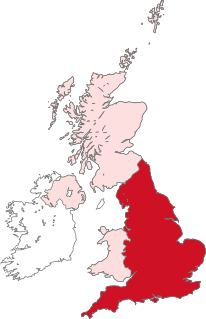
The Legislatures of the United Kingdom are derived from a number of different sources from both within the UK and through membership of the European Union. The Parliament of the United Kingdom is the supreme legislative body for the United Kingdom and the British overseas territories with Scotland, Wales and Northern Ireland each having their own devolved legislatures. Each of the three major jurisdictions of the United Kingdom has its own laws and legal system.
Devolution is the statutory delegation of powers from the central government of a sovereign state to govern at a subnational level, such as a regional or local level. It is a form of administrative decentralization. Devolved territories have the power to make legislation relevant to the area.

The West Lothian question, also known as the English question, is a political issue in the United Kingdom. It concerns the question of whether MPs from Northern Ireland, Scotland and Wales, sitting in the House of Commons should be able to vote on matters that affect only England, while MPs from England are unable to vote on matters that have been devolved to the Northern Ireland Assembly, the Scottish Parliament and the Welsh Assembly. The term West Lothian question was coined by Enoch Powell MP in 1977 after Tam Dalyell, the Labour MP for the Scottish constituency of West Lothian, raised the matter repeatedly in House of Commons debates on devolution.

The National Assembly for Wales is the devolved parliament of Wales, with power to make legislation, vary taxes and scrutinise the Welsh Government. The Assembly comprises 60 members, who are known as Assembly Members, or AMs. Since 2011, Members are elected for five-year terms under an additional members system, in which 40 AMs represent geographical constituencies elected by the plurality system, and 20 AMs represent five electoral regions using the d'Hondt method of proportional representation. Typically the largest party in the Assembly forms the Welsh Government.

Referendums in the United Kingdom are occasionally held at a national, regional or local level. National referendums can be permitted by an Act of Parliament and regulated through the Political Parties, Elections and Referendums Act 2000, but they are by tradition extremely rare due to the principle of parliamentary sovereignty meaning that they cannot be constitutionally binding on either the Government or Parliament, although they usually have a persuasive political effect.

The Scottish devolution referendum of 1997 was a pre-legislative referendum held in Scotland on 11 September 1997 over whether there was support for the creation of a Scottish Parliament with devolved powers, and whether the Parliament should have tax-varying powers. The result was "Yes–Yes": a majority voted in favour of both proposals, and the Parliament was established following an election in 1999. Turnout for the referendum was 60.4%.

The Scottish referendum of 1979 was a post-legislative referendum to decide whether there was sufficient support for a Scottish Assembly proposed in the Scotland Act 1978 among the Scottish electorate. This was an act to create a devolved deliberative assembly for Scotland. An amendment to the Act stipulated that it would be repealed if less than 40% of the total electorate voted "Yes" in the referendum. The result was that 51.6% supported the proposal, but with a turnout of 64%, this represented only 32.9% of the registered electorate. The Act was subsequently repealed.
A devolved English parliament or assembly is a proposed institution that would give separate decision-making powers to representatives for voters in England, similar to the representation given by the National Assembly for Wales, Scottish Parliament and the Northern Ireland Assembly. A devolved English parliament is an issue in the politics of the United Kingdom.
Politics in Wales forms a distinctive polity in the wider politics of the United Kingdom, with Wales as one of the four constituent countries of the United Kingdom (UK).

English independence is a political stance advocating secession of England from the United Kingdom. Support for secession of England has been influenced by the increasing devolution of political powers to Scotland, Wales and Northern Ireland, where independence from the United Kingdom is a prominent subject of political debate.
A Cornish Assembly is a proposed devolved law-making assembly for Cornwall along the lines of the Scottish Parliament, the National Assembly for Wales and the Northern Ireland Assembly in the United Kingdom.
Yes for Wales! is the name used to refer to two separate cross-party pro-devolution groups that were formed in the lead up to the 1997 and the 2011 devolution referendums held in Wales.
Welsh Labour is the part of the United Kingdom Labour Party that operates in Wales. Labour is the largest and most successful political party in modern Welsh politics, having won the largest share of the vote at every UK General Election since 1922, every Welsh Assembly election since 1999, and each European Parliament election from 1979 until 2004, as well as the 2014 one.

Welsh law is the primary and secondary legislation generated by the National Assembly for Wales, using devolved authority granted in the Government of Wales Act 2006 and in effect since May 2007. Each piece of Welsh legislation is known as an Act of the Assembly. The first Assembly legislation to be proposed was the NHS Redress (Wales) Measure 2008. This was the first time in almost 500 years that Wales has had its own laws, since Cyfraith Hywel, a version of Celtic law, was abolished and replaced by English law through the Laws in Wales Acts, enacted between 1535 and 1542 during the reign of King Henry VIII.
Welsh independence is a political ideal advocated by some political parties, advocacy groups, and people in Wales that would see Wales secede from the United Kingdom and become an independent sovereign state. This ideology is promoted mainly by the Welsh nationalist party, Plaid Cymru, the non-party YesCymru campaign and the centrist party Ein Gwlad.
The All Wales Convention was set up by Rhodri Morgan, the First Minister and Ieuan Wyn Jones, the Deputy First Minister of the Welsh Assembly Government, to educate the public about the current system of government in Wales and to promote a debate throughout Wales on the National Assembly for Wales’ current devolution settlement and whether there should be a referendum on moving to primary law-making powers.
The decision of the Parliament of Scotland to ratify the Treaty of Union in 1707 was not unanimous and, from that time, individuals and organisations have advocated the reinstatement of a Scottish Parliament. Some have argued for devolution – a Scottish Parliament within the United Kingdom – while others have advocated complete independence. The people of Scotland first got the opportunity to vote in a referendum on proposals for devolution in 1979 and, although a majority of those voting voted 'Yes', the referendum legislation also required 40% of the electorate to vote 'Yes' for the plans to be enacted and this was not achieved. A second referendum opportunity in 1997, this time on a strong proposal, resulted in an overwhelming 'Yes' victory, leading to the Scotland Act 1998 being passed and the Scottish Parliament being established in 1999.

In the United Kingdom, devolution is the statutory granting of powers from the Parliament of the United Kingdom to the Scottish Parliament, the National Assembly for Wales, the Northern Ireland Assembly and the London Assembly and to their associated executive bodies the Scottish Government, the Welsh Government, the Northern Ireland Executive and in England, the Greater London Authority and combined authorities.
The Smith Commission was announced by Prime Minister David Cameron on 19 September 2014 in the wake of the 'No' vote in the 2014 Scottish independence referendum. The establishment of the commission was part of the process of fulfilling The Vow made by the leaders of the three main unionist parties during the last days of the referendum campaign. The Vow promised the devolution of more powers from the Parliament of the United Kingdom to the Scottish Parliament in the event of a No vote.

The Wales Act 2017 is an Act of the Parliament of the United Kingdom. It sets out amendments to the Government of Wales Act 2006 and devolves further powers to Wales. The legislation is based on the proposals of the St David's Day Agreement which were not included in Wales Act 2014.













